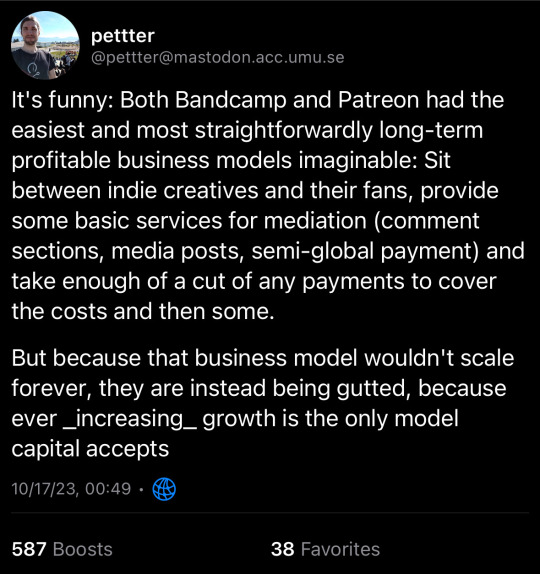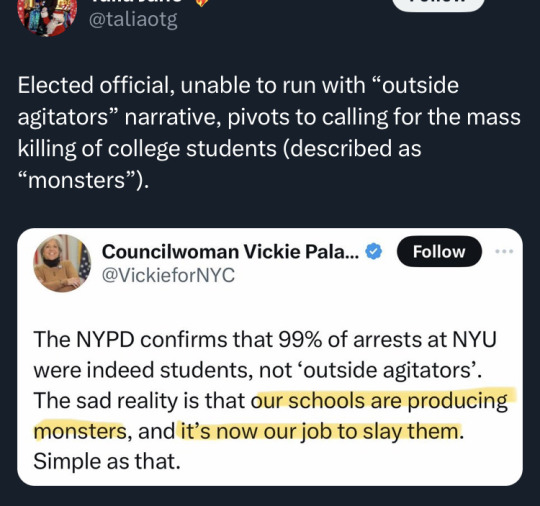#late stage of capitalism
Explore tagged Tumblr posts
Text






























⋆。˚ ☁︎ ˚。⋆。˚☽˚。⋆ ⋆。˚ ☁︎ ˚。⋆。˚☽˚。⋆ ⋆。˚ ☁︎ ˚。⋆。˚
O Jesus, through the Immaculate Heart of Mary,
I offer you my prayers, works, joys and sufferings of this day
for all the intentions of your Sacred Heart,
in union with the Holy Sacrifice of the Mass throughout the world,
for the salvation of souls, the reparation for sins, the reunion of all Christians,
and in particular for the intentions of the Holy Father this month.
Amen
⋆⁺₊⋆ ☀︎ ⋆⁺₊⋆ ⋆⁺₊⋆ ☀︎ ⋆⁺₊⋆ ⋆⁺₊⋆ ☀︎ ⋆⁺₊⋆ ⋆⁺₊⋆
#divine machinery#mechanical divinity#the holy mecha#transhumanism#cyberpunk#down with the system#late stage of capitalism#anti capitalism#the wicked will not inherit the kingdom of god#cybercore#facial recognition is evil
171 notes
·
View notes
Text

If there are doubts, we are still in the Holocene. But don't discard the Anthropocene! | Se há dúvidas, ainda estamos no Holoceno. Mas não jogue o Antropoceno no lixo!
(PART II - PARTE II)
🇬🇧
Geologically, we have consensus.
But what do we do with the debates that the Anthropocene has sparked? For better or for worse, thinking about a new epoch in geological time has somehow sensitized humans to the intense processes of environmental degradation, demonstrating, in a way, a concern for the future. But humans have existed for a long time, and the systematic destruction of everything has only been happening for a few hundred years.
So, do we discard the term Anthropocene? Let's look at this term from a new perspective.
Jason W. Moore in his work "Anthropocene or Capitalocene - Nature, history, and the crisis of capitalism" (2016) brings the discussion beyond geosciences. The concept of "Capitalocene" was introduced by Moore, a sociologist and economic historian, as a critical perspective on the relationship between the global capitalist system and the contemporary environmental crisis.
Unlike the term Anthropocene, which highlights the generalized human influence on planetary conditions, Moore proposes "Capitalocene" to emphasize that the environmental crisis is intrinsically linked to how global capitalism operates and exploits natural resources. The Capitalocene argues that the economic practices of capitalism are fundamental to understanding environmental degradation on a global scale because it highlights the relentless pursuit of economic growth, intensive exploitation of natural resources, and the pursuit of profit as central factors driving the environmental crisis.
The logic of capitalism leads to a predatory relationship with nature, where resources are exploited unsustainably to sustain the model of capital accumulation. This perspective emphasizes how social, economic, and environmental relations are interconnected and how the environmental crisis cannot be understood in isolation from the global capitalist structure. The Capitalocene, therefore, draws attention to the need to analyze and address the structural roots of the environmental problem, considering the dominant influence of capitalism on production and consumption practices.
Should we understand this as a new proposal for a geological epoch? Certainly not! But, we should understand this within the socio-cultural and historical sphere. We are dealing with Capitalism as a world-ecology, a cruel way of living that restricts almost all exits from this system. The problem to be discussed is the Capitalocene and how we will (if we will) emerge alive from it.
🇧🇷
Geologicamente, temos um consenso.
Mas o que fazemos com os debates que o Antropoceno originou? Para o bem ou para o mal, pensar em uma nova época no tempo geológico fez com que os Humanos de alguma forma se sensibilizassem com os processos intensos de degradação ambiental, e demonstra, de certa forma, uma preocupação com o futuro. Mas os seres humanos existem há muito tempo, e a destruição sistemática de tudo o que existe tem apenas algumas centenas de anos.
Então jogamos o termo Antropoceno no lixo? Vamos olhar esse termo sob uma nova perspectiva.
Jason W. Moore em sua obra Antropoceno ou Capitaloceno - Natureza, história e a crise do capitalismo (2016) traz a discussão para além das geociências. O conceito de "Capitaloceno" foi introduzido por Moore, um sociólogo e historiador econômico, como uma perspectiva crítica sobre a relação entre o sistema capitalista global e a crise ambiental contemporânea.
Ao contrário do termo Antropoceno, que destaca a influência humana generalizada nas condições planetárias, Moore propõe o "Capitaloceno" para enfatizar que a crise ambiental está intrinsecamente vinculada ao modo como o capitalismo global opera e explora os recursos naturais. O Capitaloceno argumenta que as práticas econômicas do capitalismo são fundamentais para compreender a degradação ambiental em escala global pois, destaca a busca incessante pelo crescimento econômico, a exploração intensiva dos recursos naturais e a busca por lucro como fatores centrais que impulsionam a crise ambiental.
A lógica do capitalismo leva a uma relação predatória com a natureza, em que os recursos são explorados de maneira insustentável para sustentar o modelo de acumulação de capital. Essa perspectiva destaca como as relações sociais, econômicas e ambientais estão interconectadas e como a crise ambiental não pode ser compreendida isoladamente da estrutura capitalista global. O Capitaloceno, assim, chama a atenção para a necessidade de analisar e abordar as raízes estruturais do problema ambiental, considerando a influência dominante do capitalismo nas práticas de produção e consumo.
Devemos entender isso como uma nova proposta de época geológica? Certamente não! Mas, devemos entender isso dentro da esfera sócio-cultural e histórica. Estamos lidando com o Capitalismo como uma ecologia-mundo, uma forma de viver cruel, que cerceia quase todas as saídas desse sistema. O problema a ser discutido é o Capitaloceno e como sairemos (se sairmos) vivos dele.
Missing part I? Click the link below | Perdeu a parte I? Clique no link abaixo
#science#universe#geology#biology#earth#anthropocene#capitalocene#capitalism#fuck capitalism#late stage of capitalism#geoscience
6 notes
·
View notes
Text



Reddit’s even kicking that dead ceos ass
Edit- Please help Nader if you cam
Please help Sami
53K notes
·
View notes
Text

16K notes
·
View notes
Text






i realized i never posted this on tumblr??? anyways here ya go tumblr
31K notes
·
View notes
Text

55K notes
·
View notes
Text
I'm up to the "I dunno maybe children working 13 hour shifts is bad, guys" part of Capital and it feels important to inform people that haven't read it yet that capitalists in the 19th century were not by any means wringing their hands and twirling their mustaches about employing children to squeeze out profits, they were hiring "experts" to write newspaper articles for them, explaining how "well, the socialists have these big demands about an 8-hour work day, and taking Saturdays off, but it's actually just so complicated, it's too complicated for most people to understand, we just NEED to hire children for night shifts because the stamina of their strong, youthful bodies is the only way we can survive as a business! It's science, you see. Economics doesn't work like that, just ask our economics professors at Oxford. You CAN'T turn a profit only working people 8 hours! Trust the experts, they know. It's just so complicated..."
That exact infuriating cadence that you read in New York Times articles, in the Atlantic Monthly, in the WaPo and all the other bourgeois rags where "everything is so complicated, and it's actually a lot more complicated than you think.." that has been around since the beginning. It is nothing new. So the next time you see some op-ed from Matt Yglesias or any of those other guys huffing their own farts about how "complicated" everything is, and how "unrealistic" a 30-hour work week is, remember that Marx was dealing with that exact class of "intellectuals" "explaining" how working 13 hours at age 10 was "vital" to the "moral fibre" of those poor kids.
62K notes
·
View notes
Text
#tiktok#squatters right#landlords are bastards#landlords are scum#landlords are leeches#landlords are parasites#landlords#housing rights#late stage capitalism#capitalism kills#capitalism#eviction notice#eviction
36K notes
·
View notes
Text

#relevant#communism#socialism#anarchism#capitalism#fascisim#police brutality#late stage capitalism#free palestine#police state#nypd#nyu#student protests
16K notes
·
View notes
Text
I know rooster teeth had a whole fucking host of problems and haven't watched their stuff in years but I still shed a tear for another day another internet group getting bought out by big media companies because "they're successful" and then being shut down because they don't make enough profit for wall street. let things stay small. not everything needs to be contract deals and billboards the beauty of the internet should be that there's thousands of little things for people to find the niche they like, not that anything that becomes popular is obviously the next big franchise and we need to throw millions of dollars at it. We live in an era where big companies are taking everything small from us. Heardle getting bought out by Spotify and then shut down bc they realized it cost more than it made. capitalism and the Internet are not built for each other.
21K notes
·
View notes
Text






























Man made man makes the machine that creates
Man-made man mines the minerals for the machine at obtains
Man-made man, that does not mines turns a blind eye to the ones that the machine inflames.
Man, who does not turn a blind eye gets shot with no camera in sight, and gets paid no mind for the machine changes the timeframes
Man-made man, makes mandatory maintenance for the machine, and to his home? He drains.
#mechanical divinity#divine machinery#the holy mecha#transhumanism#anti human#late stage of capitalism
9 notes
·
View notes
Text

Looks like a fucking train car in an anti communist sci fi novel released in the 50s and I mean that in the most derogatory way possible
32K notes
·
View notes
Text

#leftism#socialism#anti capitalism#leftists#anti capitalist#leftist#general strike#replace the constitution#late stage capitalism#universal healthcare#healthcare#uhc ceo#uhc shooter
8K notes
·
View notes
Text

4K notes
·
View notes
Text
This is what happened when a fanfic site is profit driven. Wattpad sucks 😞

The email/DM from Wattpad is so condescending. Imagine pressuring writers to update and work while they are doing it for free and fun. Also, the discovery? Algorithm? Of Wattpad looks like a stressful popularity contest 😑
#wattpad#ao3#fanfic#fandom#writing#writer#archive of our own#twitter#the capitalization of fandom is a sin#capitalism strikes again#capitalism#late stage capitalism#when your hobby is used for the profit of a corporation
41K notes
·
View notes
Text
One side effect of my research for this novel being steeped heavily in textile history is my swelling disgust with modern fabrics.
Firstly they're so thin? Like most things you see in Old Navy or even department stores might as well be tissue paper?? Even some branded sports t-shirts I've bought in recent years (that are supposed to be 'official apparel' and allegedly decent quality) are definitely not going to hold up more than a year or two without getting little holes from wear.
This side of even two hundred years ago fabrics were made to be used for YEARS, and that's with wearing them way more often because you only owned like three sets of clothes. They were thick and well made and most importantly made to LAST. And they were gorgeous?? Some of the weaves were so fine and the drape so buttery we still don't entirely know how these people managed to make them BY HAND. Not to mention intricate patterning and details that turned even some simple garments into freaking ART.
I know this is not news, the fast fashion phenomenon is well documented. Reading so much about the amazing fabrics we used to create and how we cherished and valued them, though, is making it hard not to mourn what we lost to mass production and capitalism. Not just the quality of the clothing and fabrics themselves, but the generations of knowledge and techniques that are just gone. It makes me what to cry.
I need to get a sewing machine.
#textile history#fast fashion#textiles#weaving history#novel research#mass production#late stage capitalism#capitalist hell#fiber arts
9K notes
·
View notes